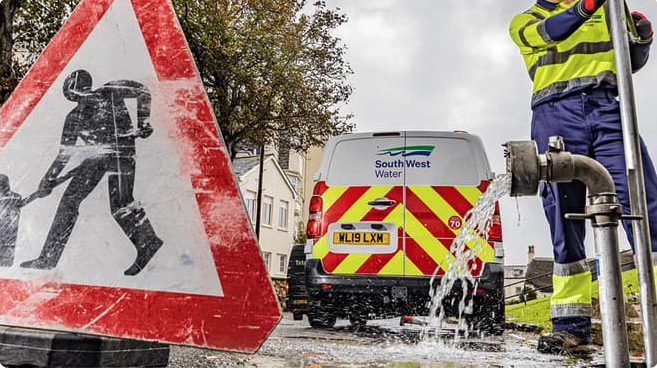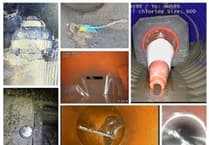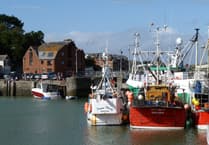SOUTH West Water will be required to invest £24-million into its waste water network after enforcement by the water regulator.
OFWAT has confirmed that it comes amid multiple failures to prevent spillages entering the sea and environment from the company’s waste water treatment work storm overflows.
The enforcement package will require South West Water, using money from shareholders, to invest £20-million between 2025 and 2030 to reduce spills from specific storm overflows, targeting environmentally sensitive areas or within focused community areas.
It will also be required to establish a £2-million local fund to tackle sewer misuse and misconnections, which can also contribute to the pollution of the environment.
There will also be £2-million of funding through a nature recovery fund to support environmental groups in delivering local environmental improvements.
South West Water said that it is pleased that OFWAT accepted its proposal for the £24-million ring fenced investment, which it says will be spent on top of the £760-million they are already planning to invest in the next five years to upgrade and address identified issues in its wastewater network which comprises 655 waste water treatment works across its supply area.
The £24-million enforcement package OFWAT has secured with South West Water is greater than the penalty that it would otherwise have imposed on the company, which would have been £19-million, 6.5 per cent of South West Water’s annual turnover).
Instead, the regulator states that by agreeing a £24-million deal with the company as opposed to fining them £19-million, money will remain in the water sector and be spent on making improvements to service for the benefit of South West Water customers and the local environment.
In a report explaining the regulators decisions to accept undertakings from South West Water, OFWAT laid bare some of the failings identified, stating: “We have identified that just over half of South West Water's WWTW (Waste Water Treatment Works) have storm overflows associated with them that spill regularly to the environment – over 54 per cent (with spill monitors which were operating for at least 90 per cent of the time) have spilled on 20 or more occasions in at least one of the four years between 2020 and 2024, and over 38 per cent have spilled on more than 60 occasions.
“South West Water has failed to demonstrate that these spills resulted from exceptional circumstances and, in most cases, has failed to properly consider whether cost beneficial solutions existed to address these problems. These high spill levels result from South West Water not having properly operated and maintained its WWTW, which is reflected in the number of WWTW that appear not to have complied with their environmental permit requirements in relation to flow to full treatment (21 WWTW), dry weather flow (16 WWTW) and storm tank volumes (18 WWTW).
“We also identified high spill volumes on storm overflows related to the rest of South West Water's sewerage network. We consider the problems identified to be systemic and that they have been occurring since at least 2017.
“The evidence also demonstrates that South West Water did not have in place appropriate processes and controls to ensure that it was able to properly carry out its wastewater business. It lacked adequate processes to enable it to properly monitor and assess compliance with its legal and regulatory obligations and took too long to investigate and address the potential issues that it did identify. South West Water did not manage its compliance risks effectively, in many cases waiting until contraventions occurred before taking remedial action, and its senior management and Board had inadequate oversight in relation to compliance.”
“South West Water’s failure to operate and manage its WWTW and network appropriately has meant that it has not minimised the adverse effects its disposal of wastewater can have on the environment.

“This failure has meant that there have been unjustified spills of wastewater from its WWTW and network - where wastewater has not gone through all the treatment processes it is supposed to before being released into the environment. Our assessment concluded that 23 per cent of WWTW storm overflows were spilling greater than 60 times in 2021 without appropriate action being taken to address them.
“Such spills impact on the environment and can cause harm to the health and biodiversity of water bodies, the ability of customers to use water bodies recreationally in a safe way, and on customer and public trust in South West Water, the wider water sector and its regulatory regime.
“South West Water has already taken some steps to restore compliance at its WWTW. These include investing more than £16-million to remedy the 21 WWTW that have failed to meet flow to full treatment requirements. It is in the process of delivering a £100-million storm overflow reduction plan, supported with a £45-million shareholder investment that is intended to reduce spills from storm overflows.
“During AMP7, South West Water secured funding under the Green Recovery programme to progress a further 100 investigations into high spilling storm overflows. By April 2022, this had expanded to 260 investigations, prioritised using 2021 EDM data. The company has also strengthened its internal processes and controls regarding the collection and analysis of flow and spill data to enable it to better understand its compliance position.
“Since opening our investigation South West Water has introduced new governance arrangements to ensure greater oversight of its compliance with its legal and regulatory obligations, including to improve the way it manages risks and reports on performance to its Executive and Board.”
Lynn Parker, senior director for enforcement at Ofwat, said: “Our investigations found failures in how Anglian Water and South West Water have operated and maintained their sewage works and networks, which has resulted in excessive spills from storm overflows. These are serious breaches and are unacceptable.
“We understand that the public wants to see transformative change. That is why we are prioritising this sector-wide investigation which is holding wastewater companies to account for identified failures. We are pleased both companies have accepted that they got things wrong and are now focusing on putting that right and taking action to come back into compliance. We expect all companies to do the same so that customers can regain confidence in their water company and the critical service they provide.”
Susan Davy, the chief executive officer of South West Water, said: “We are pleased that Ofwat has completed its review into wastewater at South West Water as part of its sector wide investigation, and that it has accepted our ringfenced investment programme of £24-million to spend even more to further reduce spills and tackle sewer misuse.
“For South West Water, Ofwat’s findings related to historical issues. I have always said that when things go wrong, it is how we respond and put things right and that is exactly what we are doing.
As well as spending more to further reduce spills and tackle sewer misuse, our £24-million investment has seen us establish a Nature Recovery Fund to benefit environmental groups in Devon and Cornwall and the wider community.
“This is in addition to the £760-million we are already investing over the next five years to reduce the use of storm overflows across the region."





Comments
This article has no comments yet. Be the first to leave a comment.